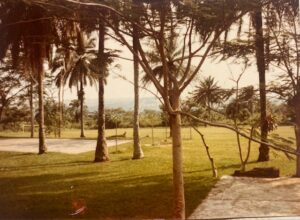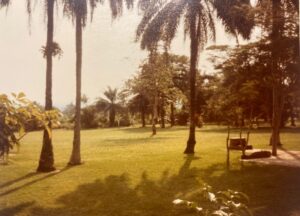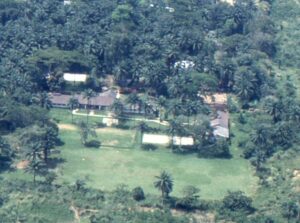


Many people feel God’s call to serve in missions. With that is the responsibility of raising their children and ensuring they are educated. This can prove challenging, depending on the foreign country one goes to. In my case, I was sent to the Ubangi Academy (UBAC) in Congo as an 8 year old. The school served grades 2 through 12, with a rigorous curriculum. Normally there were 40-50 in total attendance, with most living in the dormitory, adjacent to the school. How did parents rationalize sending their kids away, starting as young as 7 years old, for 8 to 10 weeks at a time? How did the children fare? Many struggled, and have residual trauma into adulthood. I sent surveys to parents and kids alike and determined that very few kids and parents have discussed the experience. Furthermore, many kids don’t want to revisit that part of their childhood. This is part 1 of a 5 part series, to introduce the topic and lay out the challenges for parents and kids alike. It will discuss the elephant in the room, which is: how come so few families have talked about this experience that was extremely impactful on the children. Then, the Ubangi Academy, as an institution will be discussed in more detail in part 2. The routine, expectations, schedule, culture and subcultures will be explained. Then in part 3, how parents handled the challenge of separating their families and trusting that their children were adjusting well and being well cared for will be the topic. Part 4 will be interviewing kids and their experience of the dorm ecosystem, emotional damage incurred, and how they adapted to dorm culture. Most listeners will be surprised at how most children look back at the experience. The final episode will be a summary and discuss the takeaways learned from all the interviews and surveys. And recommendations on how the kids can move forward using the positives and negatives from the experience for a better life as adults. The dilemma of balancing mission and family is very complex and controversial. I hope you join for the journey for the 5 episodes to hear the broad spectrum of perspectives on this most important issue. Special thanks to Roger and Sally Eales for sharing how they looked at the role of UBAC in their family’s life. Also Jeff Aiken provides his take on UBAC and its impact on his life as an attendee and then as an adult.
**Rated in 2024 to the TOP 25 Best “Life Stories” Themed Podcasts Worldwide – https://blog.feedspot.com/life_stories_podcasts/
Podcast: Play in new window | Download

Jeff, great first episode about UBAC. I’m really looking forward to the episodes to come. Thank you for sharing.
If you get hate mail or get cut off then they weren’t friends to begin with. Your intentions were/are good and you have taken care to provide many different viewpoints , more than I would have!
I firmly believe that on balance sending a child away at 7 years old is wrong 100 percent of the time (on balance) with long term negative effects and that early development psychologists and science would back me up. This does not mean that they can never recover or live meaningful lives, just that they face stronger headwinds than their counterparts. Some who use this experience to get stronger does not negate the long term negative consequences,
I appreciate Jeff Aiken’s perspective on UBAC as mostly a positive one. Later years in high school were mostly positive for me as well. An additional thought about the importance of God versus family versus ministry …..I think it is a false dichotomy to say that God and ministry always come before family…..rather there are times when family supersedes ministry, and the complexity is to know when that is even as God always comes first. I don’t envy my parents decision but I do find it fascinating that there were always options such as Bob Thornblooms correspondence courses from the 1940’s. I was always told there were no other options.
My parents always told me there were no other options when I noted the negative consequences of early childhood.
Thank you, Jeff. Well done.
Those coming from Congo (Brazza.) and Bangui (ie the farthest),
truly did not have parents visit or the opportunity for their parents to visit. However, there were many visits from almost all parents, at least once during a semester, who were at the stations in DRC (formerly Zaire).
It was about logistics that the EFC/ECC families were able to do that and to care for each other. The opportunity was there.
Having said that, my parents (Wes and Joy Daniels) considered it a privilege that their children were able to attend UBAC and communicated that to us. Yes, they, also dealt with the issues of sending their children BUT communicated to us their love of God and us and what God calls us to do at different times in our lives. They were often alone ( only family on the station ) but they leaned into the family of God ( congolaise and anglaise).
They modeled creating “chosen family” and not just biological.
Thank you again, Jeff.
Looking forward to the next podcasts.
Beth, I remember my first trip to the dorm. You, Mark, Dorcas, and Ruth came up the river to Kala by boat and we all piled into the big stake truck for the big trip to Karawa. I don’t remember how many of those trips we made together before the plane flew over more regularly, but that first trip was my first big road adventure and it sticks in my mind….as a good memory!
Jeff Aiken
Good and complex topic dear to many of us. Thanks for taking this on!
There are multiple factors on one’s perspective of UBAC: Did you go at 2nd grade? Did you have older siblings? Did you start at an older age? How smart were you? How athletic were you? What was the makeup of your class?
My prayer is for emotional healing and especially for spiritual healing for so many. Jeff Aiken, I loved your boat analogy. I’m going to keep reading these comments for dialogue as more of Jeff Eales podcasts come out.
Lindy,
You are so right, there are so many facets to our experiences and lives.
I too will be checking back as this series unfolds.